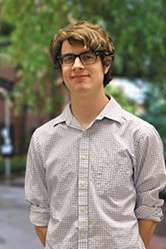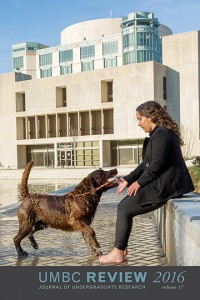Physics and Math
“Entanglement Dynamics of Inductively Coupled Singlet-Triplet Qubit”

A quantum computer has the ability to solve certain problems exponentially faster than a classical computer at the expense of rigorously challenging manipulation of quantum bits (qubits). Recent advances in solid state physics have improved the fabrication of spin qubits by confining electrons in a 2D Fermi gas of Gallium Arsenide- Aluminium Gallium Arsenide heterostructures (i.e. quantum dots). These qubits entangle electrostatically but suffer decoherence due to external coupling to nuclear spins thus limiting the time for logical controlled NOT operations to take place. We investigate alternative coupling methods for two qubits such that their interaction is amplified. For example, two qubits can be entangled at distances on the order of microns via a floating metallic gate that mediates their electrostatic interaction (i.e. capacitive coupling). We theoretically examine how the entanglement dynamics of the system are affected by stray inductance in the floating gate when the qubit’s charge configurations are driven at high frequencies.

Who is your mentor for your research? How did you arrange to work with this person?
My research is supervised by Dr. Jason Kestner, Assistant Professor in the Physics Department. One day I came to his office as a nervous freshman and he was able to find a project for me. The project later expanded into a more interested a complex problem that I could model and optimize.
How did you know this was the project you wanted to do?
The project was proposed by my mentor and I was happy to work in his research field (quantum computing). As I continued with the research, our ideas began to modify the project and it became more challenging and interesting. Most research in quantum computation is appealing due to the exciting properties of quantum mechanics and its applications.
Is this your first independent research/scholarship/artistic project?
I work on other projects at NASA during the summer and winter.
Do you get course credit for this work?
Yes. During the semester I take 3 credits in Physics 499 and 499H.
How much time do you put into it?
It varies quite a bit. Depending on how busy I am with work or school, I can put as much as 20 hours into it or as little as 5 hours into it a week.
How did you hear about the Undergraduate Research Award (URA) program?
Other physics majors that I study with have received this award. Also my mentor suggested it to me.
What academic background did you have before you applied for the URA?
Most of my background before I started the research came my own curiosity towards quantum mechanics. The introductory courses in quantum mechanics would not suffice. Once the research started, my understanding of the field began to develop.
Was the application difficult to do?
No.
How much did your mentor help you with the application?
He proof read the application before it was submitted.
What has been the hardest part about your research?
The hardest part of research is trying to come up with the right question to ask. It is quite common that you don’t find the answer you are looking for in your preliminary work. In order for your ideas and research to have merit, they must be answering an important and well crafted question that will make people interested in your research. This question must balance between the big picture and the technical details in the research field.
What was the most unexpected thing?
Unexpected things happen in research all the time. That is what makes it interesting. When you spend months on a calculation and the results disagree with your original intuition, you either need to change your understanding of the physical theory or restructure the question at hand.
How does your research relate to your work in other classes?
It is hard to compare the two. In the classroom, you are learning theories that were developed 50 to 100 years ago that are fairly simple compared to modern science. There is an incredible amount of self teaching you have to endure when you first start the project. Most of the background knowledge I needed to know to start the project was buried deep into graduate level textbooks and previously published papers.
What else are you involved in on campus?
Aside from research, I am a learning assistant for physics 122, and a grader for upper level physics classes. I also help run SPS (society of physics students). In my free time, I play music on campus with UMBC pep band, Catholic Retrievers, and theatre productions as well as off campus local gig throughout Baltimore.
What is your advice to other students about getting involved in research?
Find out what you are passionate about. Look in your department’s faculty directory and decide which faculty members do research that are closest to your interests. Read some of their publications and get familiar with their semantics. When you approach them in their office they should be impressed with your background knowledge.
What are your career goals?
Continue to do research in both experimental and theoretical quantum computation and other fields of applied quantum mechanics at the PhD level. Eventually, I would like to expand my research interests into more abstract topics like field theory, astrophysics, and scientific philosophy.
9/2/2015